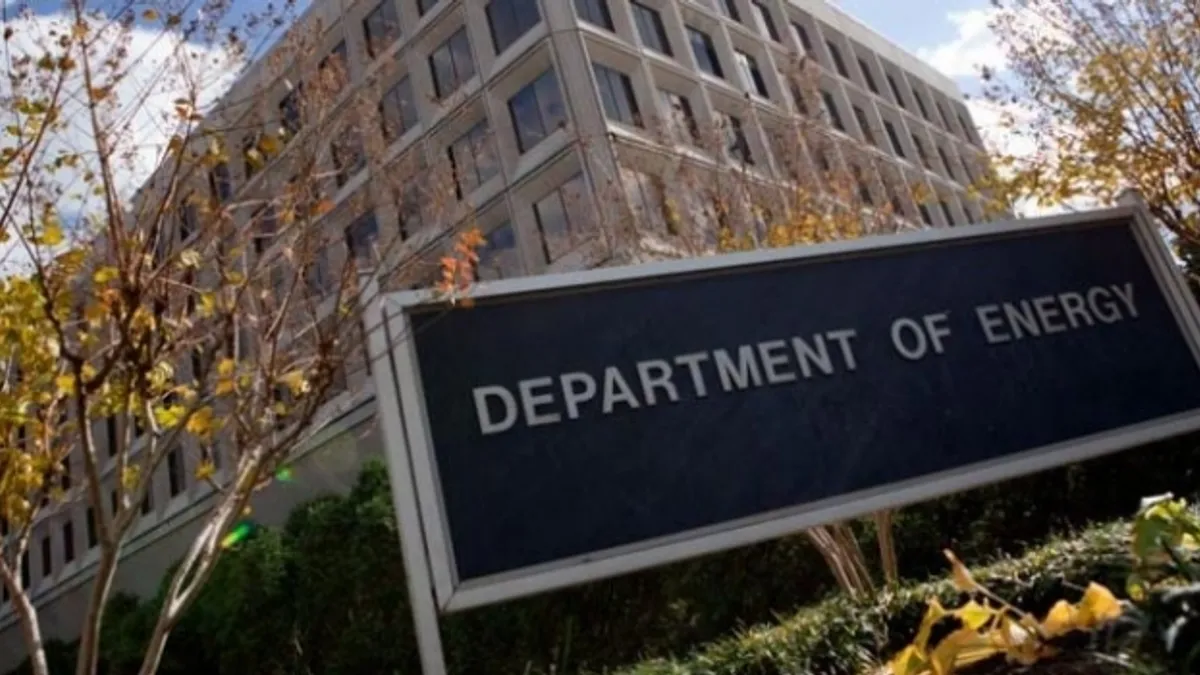Dive Brief:
-
The Department of Energy remains focused on President Trump's directive to preserve nuclear and fossil fuel generators, according to the department's head attorney.
-
"If you set aside all the political rhetoric about fossil energy, you set aside all the political tug-of-war on what emerging fuel source will take the place of fossil energy, our country still needs fossil fuels," DOE General Counsel Bill Cooper said at the Energy Bar Association's mid-year forum in Washington, D.C. on Wednesday. "That fuel will remain a staple of our energy supply for many years to come."
-
Cooper also emphasized the department's role in meeting "the president's challenge to revive, revitalize and expand the nation's nuclear energy sector." "I think most of my stuff that I work on involves nuclear," he said.
Dive Insight:
Cooper's comments come as industry groups ramp up pressure on federal regulators to take action as more coal units go offline and new nuclear buildouts prove too expensive for most utilities.
The American Coalition for Clean Coal Electricity sent letter templates to state commissioners in July, urging the Federal Energy Regulatory Commission (FERC) to address reliability concerns brought on by coal retirements across their service areas. Six commissioners from coal-heavy states sent letters based on the template to FERC in September.
"We're working to urge FERC to act on an issue that is important to the nation's coal and nuclear fleets and to the electricity grid," former West Virginia Commissioner and ACCCE consultant Jon McKinney wrote in an email urging regulators to send the letters.
Trump's DOE has made nuclear and coal a priority from the beginning, citing grid resilience and reliability concerns.
The Department's "primary mission" within its office of fossil fuels is to "ensure the nation can continue to rely on traditional resources," said Cooper, such as natural gas and coal-fired power.
"Fossil fuels are not some kind of snake oil being sold by somebody who doesn't believe in it, to a public who doesn't want it," he added.
As a result, DOE's labs make "substantial investments" in hydraulic fracturing and shale gas research, he said. Trump's energy department, along with the Republican-led Senate, have also prioritized "clean coal" research, largely focused on carbon capture and sequestration, as well as the continued development of small modular nuclear reactors.
The four nuclear priorities for DOE under "the president's challenge," according to Cooper, include:
-
Sustaining the country's existing nuclear fleet
-
Getting advanced nuclear reactor technologies "over the finish line"
-
Establishing and maintaining critical fuel cycle infrastructure
-
Enhancing global competitiveness for U.S. developers to be able to sell their technology abroad
NuScale remains the closest developer to actually operating its advanced nuclear reactor, having completed the second and third phases of its federal permitting. The nuclear company and Senate Committee on Energy and Natural Resources Chair Lisa Murkowski, R-Alaska, have floated the idea of a partnership between DOE and the Department of Defense to spur the domestic small scale nuclear market.
Last year, DOE proposed more drastic measures to save ailing generators — a bailout for coal and nuclear plants. Energy Secretary Rick Perry stepped back from that rhetoric at an electric utility conference in June, saying the Department has "no regulatory or statutory ability" to craft a bailout plan.
DOE has also been criticized under Trump for substantially delaying energy efficiency standard reviews and failing to issue or update standards. But Cooper defended the department's role as an efficiency regulator.
"We take our role very seriously, particularly in the enforcement realm. If there's a regulation and you violate it, we're going to enforce it," he said. "So we're incredibly serious about our role in developing the energy efficiency and the technologies through" the Office of Energy Efficiency and Renewable Energy Technologies.














